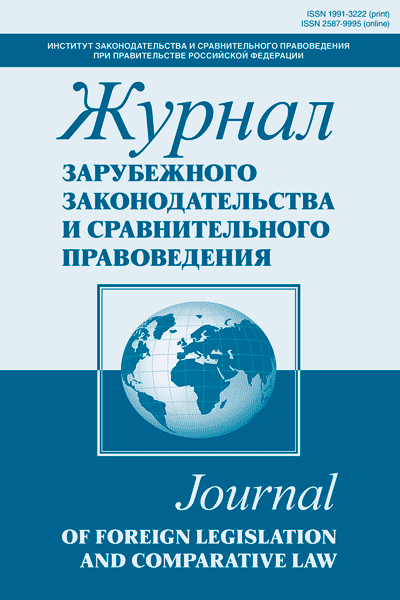Contractual succession of legal claims and liabilities in administering rules of private international law is a quite complicated practical problem. The correct choice of the applicable law is the priority in this situation. As of today inheritance of movables, including claims, liabilities takes place according to the connecting factors’ rules “lex patriae” and “lex domicilii” which according to the offered assumption, are not adequate in a situation of the inheritance by contract. It is worth mentioning that in some cases the right to claim, liability acquires legal regime called “res in transitu” which requires special succession regime. Secondly, it is necessary to evaluate the subject matter of the contract. Inheritance by contract is mediated by the tools of the contractual right which is based on the concluded contract with the cross material perquisites evaluated in a certain sum. Due to this circumstance the assessment should be accepted as a basis for the contract price. Since in accordance with the current legislation the assessment can be made solely in relation to a constant liability (for example, in the situation with a contract of purchase), in case of a contractual inheritance of legal claims (cession), it is not clear how provisional assessment can be made, as the cost of liabilities can change drastically depending on circumstances in the course of a certain period of time. This article is devoted to the investigation of these problems.
Applicable law, claims, inheritance by contract, liabilities.
1. Beale H. Contract Law (Common Law of Europe). Oxford, 2002.
2. Blakesley Ch. L. Louisiana Family Law (1992). Scholarly Works. Paper 841.
3. Davies J., Rathke S. R. Choice of Law Based on the Seat of the Relationship. Valparaiso University Law Review. 1975. Vol. 1.
4. Halson D. Contract Law (Common Law Series). 3rd ed. Butterworths, 2007.
5. Palermo J. S. Donations À Cause de Mort: A Civilian Solution to Characterization of Gratuitous Transfers that Elude Donative Classification
6. Under the Louisiana Civil Code. Louisiana Law Review. 1977. Vol. 37.
7. Samuel G. Law of Obligations. Cheltenham, 2010.
8. Shulman J. The Parent as (Mere) Educational Trustee: Whose Education Is It, Anyway?. Nebraska Law Review. 2010. Vol. 89.
9. Yiannopoulos A. N. Real Rights: Limits of Contractual and Testamentary Freedom. Louisiana Law Review. 1969. Vol. 30.
10. Zimmermann R. The Law of Obligations. Roman Foundations of the Civilian Tradition: the Concept and its Historical Development. Cape Town, 2010.
11. Braginskiy M. I., Vitryanskiy V. V. Dogovornoe pravo: obshchie polozheniya. M., 1998.
12. Derenburg G. Pandekty. Obyazatel´stvennoe pravo. M., 1911.
13. Ioffe O. S. Obyazatel´stvennoe pravo. M., 1975.
14. Obshchaya teoriya prava i gosudarstva: uchebnik / pod red. V. V. Lazareva. 2-e izd. M., 1996.
15. Prikhod´ko A. I. K voprosu o protsessual´nom pravopreemstve. Zakon. 2007. № 4.
16. Sadikov O. N. Spetsifika regulirovaniya nekotorykh grazhdanskikh pravootnosheniy. Sovetskoe gosudarstvo i pravo. 1978. № 3.
17. Tarnopol´skaya S. V. Protsessual´nye aspekty realizatsii prav novogo kreditora po ustuplennym trebovaniyam. Sovetnik yurista. 2010. № 5.
18. Tatarintseva E. A. Fakticheskoe vospitanie kak osnovanie vozniknoveniya semeynykh pravootnosheniy. Vestnik TvGU. Seriya «Pravo». 2014. № 4.
19. Franchozi Dzh. Institutsionnyy kurs rimskogo prava / per. s ital.; otv. red. L. L. Kofanov. M., 2004.





